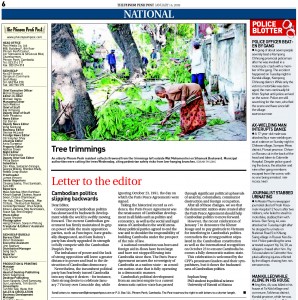Internet
now browsing by category
Cambodian politics slipping backwards
| Cambodian politics slipping backwards
Written by Sophan Seng |
|
| Friday, 16 January 2009 |
Dear Editor,
Contemporary Cambodian politics has showcased its backwards development while the world is swiftly moving forward. The current Cambodian government has firmly maintained its grip on power while the main opposition parties, such as Funcinpec, have gradually disappeared, and Sam Rainsy’s party has slowly upgraded its strength to fully compete with the Cambodian People’s Party.
The imbalance of power and the lack of strong opposition will leave a greater distance in power and lead to the destruction of Cambodian democracy.
Read More …
Things of connectiveness of nationalism
1. Identity
Individual/personal identity, collective identity, and national identity
2. Push factors, pull factors of immigrants
Historical push and pull factors, geographical push and pull factors, economic push and pull factors, political push and pull factors, social push and pull factors
3. Understanding of nation
Language, ethnicity, culture, religion, geography, relationship to land, spirituality, politics, shared value and beliefs
4. My loyalty to (contending nationalist loyalties?)
a person, a cause, an idea, a value, a nation, a community, myself
Religious Loyalty, Regional Loyalty, Ethnic Loyalty, Class Loyalty, Cultural Loyalty
5. Think…Participate…Research…Communicate, Recall…Reflect…Respond
6. Should nations pursue national interest?
National Interest and Foreign Policy (how do national interest and foreign policy shape each other?), Nationalism and Ultranationalism (how can nationalism lead to ultranationalism?), Ultranationalism and Crimes Against Humanity (how can ultranationalism lead to crimes against humanity?), National Self-Determination (should national self-determination be pursued?)
7. How does ultranationalism developed?
Countries in Crisis, Charismatic Leaders, Instilling Ultranationalist Values
8. Should internationalism be pursued?
Nations, Nation-States, and Internationalism: does involvement in international affairs benefit nations and states?
Foreign Policy and Internationalism: should foreign policy promote internationalism?
Internationalism and Nationalism: does promoting internationalism affect nationalism?
Internationalism and Global Issues: how effectively does internalism address contemporary global issues?
Key terms: needs, wants, isolationism, unilateralism, bilateralism, multilateralism, supranationalism
9. How internationalism benefit nations and nation-states?
peace and security, economic stability, self-determination, internationalism and humanitarianism,
10. How can nation-states promote internationalism through foreign policy?
promoting peace, peacekeeping and internationalism, international laws and agreements, foreign aid and internationalism
11. Global Challenges
poverty, hunger, disease, debt, climate change, human rights, conflict
Key terms: absolute poverty, odious debt, civil society
12. National Myths
Myths can also represent a nation’s identity. Many cultures are founded on a creation myth — a story that tells how a place, a city, or a nation and its people came into being. These myths provided ancient peoples with a foundation for their future and a reason for their laws and traditions. They also helped unify the members of the community.
Today, myths are still used to unify a people and to promote national identity. National myths are stories that promote national values and perspectives. They can include ancient myths, such as stories of the Greek gods of Mount Olympus, and ancient religious texts, such as the Hindu epic poem Ramayana. They can also include versions of historical events and personalities.
13. How can individuals promote a national identity?
musicians, painter, story tellers
Derived from Margaret Hoogeveen 2008. Understanding Nationalism. McGraw-Hill Ryerson Publishing. macgrawhill.ca
Habits of Mind
Habits of Mind
Certain character traits — or habits of mind — promote critical thinking and effective decision making. Whether you are completing a social studies assignment or dealing with other challenges, these habits of mind can help you achieve success at school and in life.
What habits of mind or critical thinking you have pursued?
1. I’m an active thinker
I explore alternatives and consider their strengths and weekness
I persevere. The first — or most obvious — solution is not always the best.
I resist pressure to adopt opinions just because they are popular.
I think about how I’m thinking about an issue.
2. I am curious
I do not take everything at face value. I investigate beyond the obvious.
I take time to think about things and explore unanswered questions.
I look for various sources of information and expert opinions.












